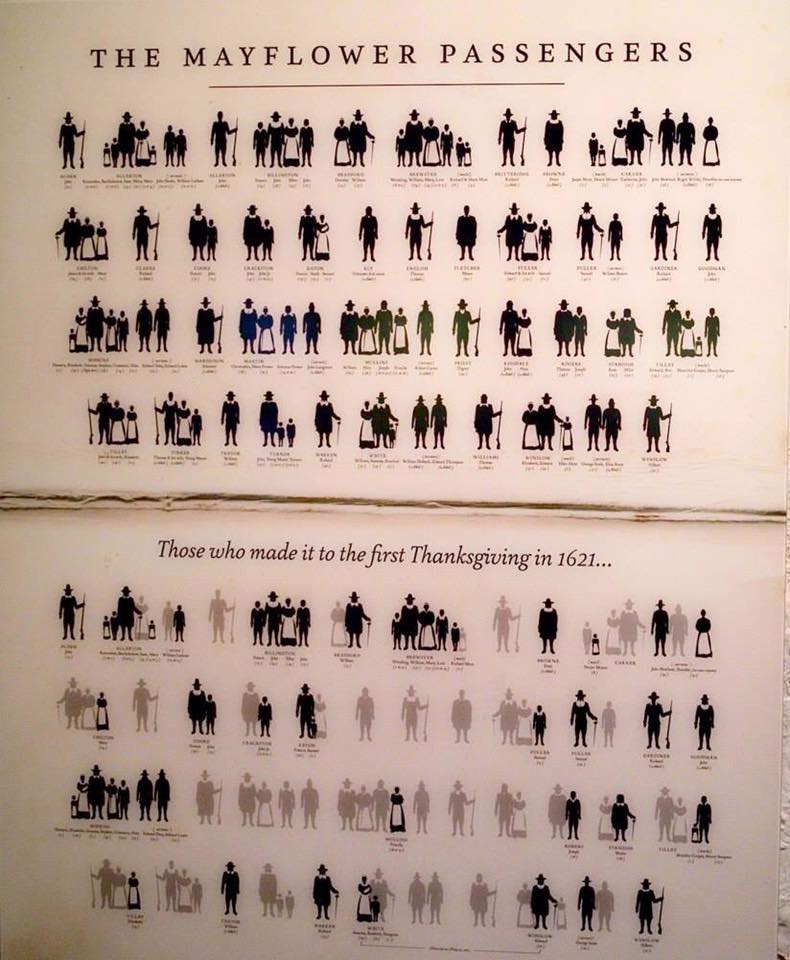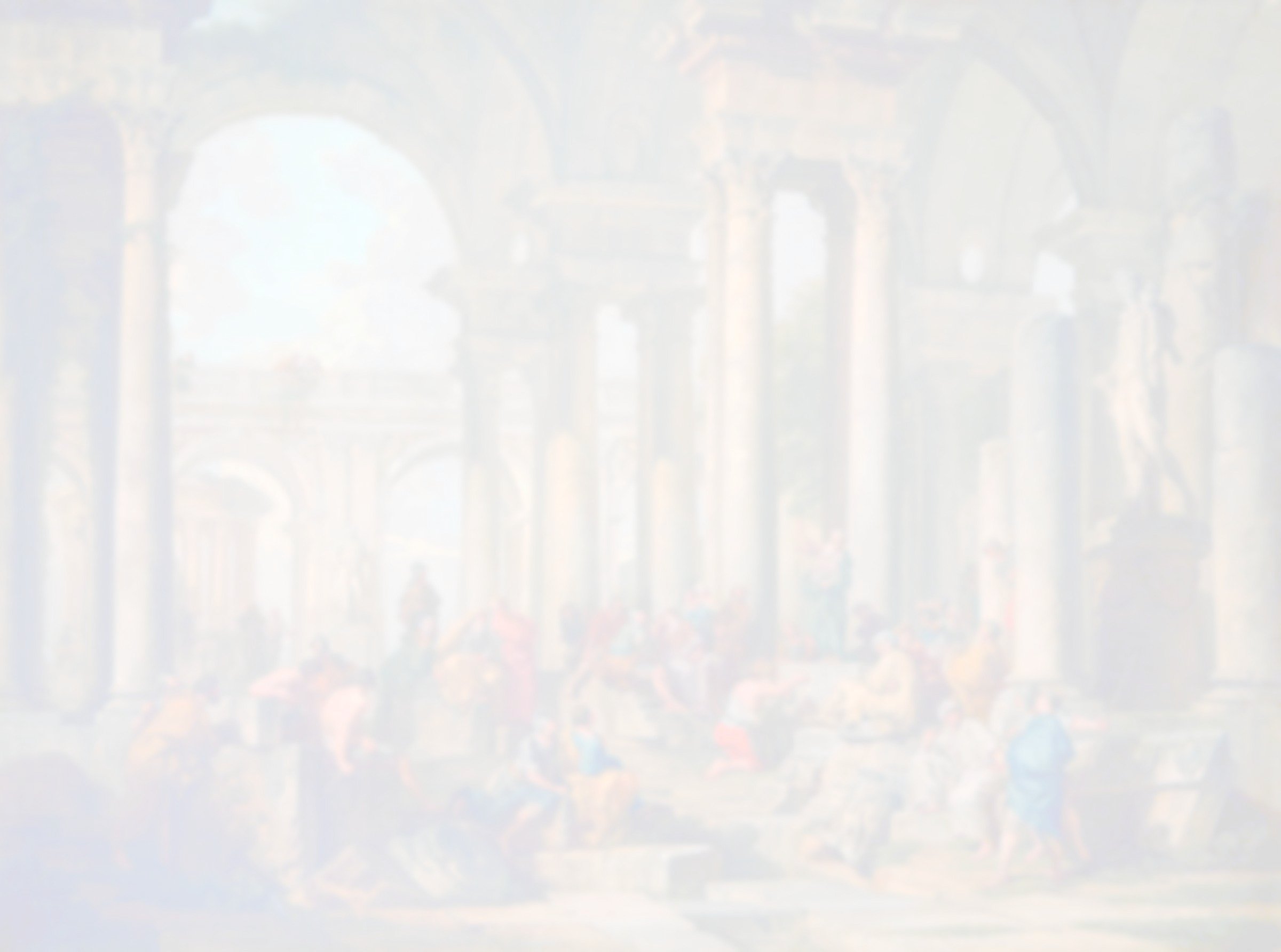Well, here's one for your consideration.
We all think of the Pilgrims as English, right? Well, they were, and they weren't. First, they weren't Pilgrims until after they sailed to America. Before that, they were called either Brownists or Puritans. And, while they were nominally English, they actually sailed from Holland, and Holland was (and still is) essentially Northern Germany (and, by the way, home to the most immediate ancestor of the English language) (which, along with their legendary tolerance is why the pilgrims would manage to fit in there) (for a while).
They had moved to Holland from England to escape the intense persecution they were being subjected to. So, why were they persecuted? Let me count the ways!
1) The Brownists/Puritans believed that each congregation should be able to run itself (independence), but that ...
2) The church of England, beholden to the king (James, in this case) of England as it was, had essentially stopped The Reformation, and had even reversed it somewhat. However, ...
3) Opposing anything The Church of England said or did was to oppose the king himself (recalling how The Church of England came into being in the first place), and ...
4) King James had a reputation for dealing very harshly with anyone who opposed his religious views.
Now, that last point is actually very controversial. Just about everything you find about King James claims that he was not only tolerant of Puritanism, but actually promoted it. But, just as I pointed out in my article about the history of the modern church's policy on priesthood, we can't always take sources at face value, especially where candor might invoke governmental wrath. As Benjamin Disraeli once opined, "Everyone likes flattery; and when you come to Royalty, you should lay it on with a trowel." Diarists have been known to whitewash their own fences. Pharaohs have been know to commission monuments to victories they not only never had, but which were actually resounding defeats. In this case, apologists need to explain why it was that so many Brownists moved to Holland. There had to have been some reason besides wanting to separate themselves from what they saw as a still-too-Catholic Church of England.

Unfortunately for them, while a mere piker compared to Elizabeth I and Henry VIII, this King James IV of Scotland was also the very same King James I of England who not only gave us the King James version of the Bible, but also, later in his life, went through Ireland like a plague, scattering families, killing the men, enslaving the children, and shipping the women to the Americas as slaves in such numbers that budget conscious plantation owners could buy ten of them for the price of a single African slave, so they did. And, as an aside, they would mate those women with that sole African slave in order to get more, stronger (than the Irish women) (who didn't live long) slaves to work their plantations. And this is all how it is that so many blacks in this country come by their European DNA that professor Henry Louis Gates, jr. (remember Obama's "Beer Summit"?) is always trying to make such a big deal out of. But, no, the only rape victims were the Irish women, and this is who the Brownists/Puritans were on the run from.
So, anyway, ever notice what our First Amendment is really ALL about? Yes, even the much vaunted and over-hyped freedom of the press is really only a sub-clause to the freedom of religion. Why? Well, what do we do at church, after all? We meet! With others just like us. We speak as we feel we ought. We print books, and we read from them. Hence, the first amendment, and all its subordinate clauses guaranteeing all of those things, is really, only, all about the free and full practice of religion, not just a lack of any responsible restraint on purveyors of so-called news or smut.
But, these Brownists, for some reason, rejected Dutch (that's the people of Holland) customs, and wanted to remain English in every way but their religion. Why? Ever been to Holland? Read up on it some time. No one of any faith would really want to live there for long. Tolerance is an understatement. Decadence would be more like it. And that's why, today, the Muslims are taking over, and driving any remaining Christians out.
But I digress.
So, the Brownists rallied, pooled their resources, and hired a couple of ships to ferry them to the newly founded Virginia Colony in the New World (aka The Americas).
Along the way, one of those ships' (the Speedwell) crew deliberately sabotaged their own ship (not an unknown practice among mariners) (Jewish property owners still today openly blame fires on Jewish lightning.), probably hoping to keep the pay without actually doing the work, and, ultimately (after even more problems) (which we'll be getting to shortly) and inadvertently gave us a new example of contract law in the form of the now famous Mayflower Compact. (It's worth looking up.)
So, after all these travels and setbacks, they're finally on their way to Virginia. Except, now you're saying, "Wait! What? Plymouth Rock is in Virginia?!" No. It hasn't moved. What you learned in school is still true. Our modern, revisionist school system did teach you that much, I hope. Plymouth Rock is in Massachusetts. Now, I understand that there's some debate about this. Some researchers claim that the pilgrims were actually headed to Plymouth (or thereabouts) all along. And this makes some sense. After all, the Virginia Colony was British owned and run, and that's precisely what they were fleeing from. They wouldn't jump from the frying pan into the fire. Well, the opposite argument uses the same reasoning. And that is that for the pilgrims to avoid the Virginia colony was the real allegory of jumping into the fire. The Virginia colony was indeed British, but so were the pilgrims. And Virginia was a long way from England, and already pretty well known for its relaxed rules. Moreover, as everyone already knows, their chosen landing proved to be anything but welcoming. Fewer than half of the original colonists would survive their first year there.

Moreover, this was 1620, almost 1,700 years since the Antikythera Mechanism was lost at sea (and utterly obliterated from human memory), and 156 years before John Harrison's revelatory marine chronometer would solve the Longitude Problem. The Pilgrims were no more able to accurately plot their arrival on the east coast of north American than was Christopher Columbus ONE HUNDRED AND TWENTY EIGHT YEARS earlier! You followed the winds and/or currents west, and hoped for the best. Then you tried to figure out where you were along about 5,000 miles of coastline, and decided whether you needed to sail north or south in order to reach your ultimate destination. And, to make matters worse, they had been blown off course by a storm, so they weren't even certain of their relative location on that coastline.
But being off course was was only part of the problem. If you've ever been to Europe, you've probably noticed that, unlike here in the USA, when you go to a restaurant, there are no glasses of ice water waiting for you. Europeans don't drink water. Unless they're trying to punish themselves. Then they drink mineral water. And usually with some added flavoring to make all that sodium bearable. Europeans drink beer. (or wine) (but mostly beer) Drinking water in Europe has traditionally been like sky-diving. It's for thrill-seekers. Because drinking water in Europe has traditionally been a bad idea, and one that all too often ended in madness or death. Even wells were not always safe, sometimes accidentally, but sometimes even deliberately. But beer is always safe. Beer is even nutritious. Beer is what you drink. (By the way, read the Word of Wisdom closely. There is absolutely NO prohibition against alcohol. Only against strong drinks. Mild drinks made of barley and/or other grains [aka BEER] are actually recommended.) (Although this is not intended in any way to recommend the stripped-of-all-nutrition, beer-flavored Kool-Aid we sell in this country.)
Well, when the Pilgrims finally reached the shores of America, it didn't much matter that they were about 700 miles off course with winter setting in. They were out of beer. And when you're out of beer, you're here. At your new home. Like it or not. So you'd better like it. And that home was Plymouth Rock. (More or less.)
Now, consider for a moment what's happened here. The Chinese, as Gavin Menzies has spent considerable time and energy arguing, had been landing all up and down the west coast of north America for centuries. (In fact, some experts now believe that it was the Chinese, or rather their rats, or rather their rats' fleas, who actually brought the plagues that wiped out the natives.) Leif Erickson and other Vikings had very famously also reached the Americas, and Viking rune stones have been found as far inland as, I think, Minnesota. (Hey, they aren't called the Vikings for nothing!) And the Spanish (actually Moors) (but that's another story) had been busy wiping out the natives as fast as they could for over a century. And lots of Hebrew and Egyptian writing and other clues have been found here, too.
But all of these other pilgrims amounted to nothing. And whoever the natives were, or had been, they weren't any more. They had decayed into largely nomadic, neolithic, illiterate, tribal communities.
It was these Brownists who finally started the first real civilization seen on this continent in centuries. (The Aztecs rose recently, and briefly, and were just as quickly extinguished by the Arab Spaniards.)
Only the Pilgrims lasted.
But they almost didn't.
Yes, you all know by now the famous story about how the Pilgrims almost died except for the help of the Indians. And how rude it was of the English settlers to give the Indians such a raw deal.
Well, it wasn't quite like that.
The Indians initially attacked the Pilgrims. Didn't know that, did you? Why would they attack? Because the Indians were just like that? Well, yes, but also, No. It was really because the Indians had seen English before. It seems some English had come by several years earlier, just browsing, looking for something they could sell or use, but, finding little to help pay the expense of the trip, were about to leave empty-handed when they noticed ... SLAVES.
They kidnapped some Indians, and took them back to England (you know, the place so bad the Brownists had to flee to Holland for their very lives) hoping to sell them as slaves. When that didn't work out as hoped, they as much as turned the poor Indians out to meet their fates. In England. Far from home. All on their own. Culture shock. Fights. Sickness. Two of them didn't last long. But the third Indian actually became a sort of social phenomenon. He learned English, got a bit of an education, and, finally, managed to sneak back to America, only to find that his whole tribe had been wiped out by a (Chinese?) plague. (After all, those who were taken to the supposed home of said plague didn't get the plague. And they LIVED among the English. The rest of the tribe hardly even SAW the English, so how did they catch the plague?) Maybe. And maybe the surrounding tribes had dinner. Like I said. They were illiterate. There were no records. Only word of mouth. But, hey, why would they lie, right? Anyway, this Indian, Squanto, joined up with one of the remaining tribes.
So, anyway, wouldn't you know it? The English-speaking Dutch Pilgrims just happened to run out of food, 700 miles off course, in the only place in millions of square miles of recently and otherwise largely depopulated territory where one could find THE ONLY INDIAN WHO SPOKE ENGLISH!
And that Indian, not really ever fitting in with his new tribe, but actually fitting in a bit better with the Pilgrims, was able to help them learn how to live off their new land.
Now you tell me. Does that make you go, hmmm?
Well, that IS a miracle; a miracle from heaven.
This is truly a divine land. The hand of God brought our ancestors here. Will we preserve what they strove to give us?
Now THAT would be a miracle!
